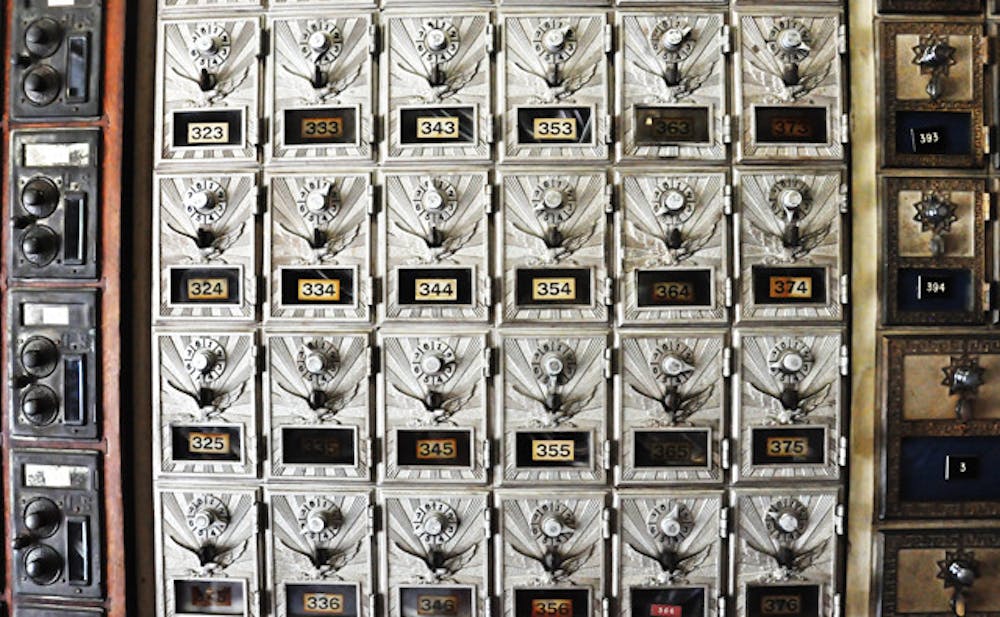The locals come for their mail and a place to get out of the sun. Out-of-towners come to show knee-high passengers the life their great-granddaddies once knew.
Time, like U.S. Highway 441 and later I-75, has passed Evinston by.
Driving down County Road 225, a slim, rough road with faded lane markers, 20 minutes south of Gainesville, you barely know you're there before you've passed it.
Since 1884, every one of Evinston's houses, Victorian-era buildings that stand in cattle pastures along the road, has been accounted for by 92 brass post boxes lining a wall in the Wood and Swink Old Store and Post Office.
Out front, it looks like a typical Florida cracker house with a tin roof and pine walls. Most of the time, one or more of the locals are on the front porch, perched in the shade atop a long bench.
Inside stands a rusty red Coca-Cola cooler, a store-length counter and the woman who worked 32 years as Evinston's postmaster, Wilma Sue Brown Wood with her husband, Freddie Wood Jr.
Outside the store's pine-shuttered windows, the Woods have seen change. The wagons that pulled up to the store have been replaced with SUVs and hybrids. They've seen young ones, who toddled into the store for sweets, grow up and bring their own children in.
Change hasn't hit so quickly inside the store. Bubble gum still goes for 3 cents. A can of Coke costs 60 cents. A 1950s cash register still chirps from the corner.
Cash or check only. No cards.
The only change, a rise in the town's population, is tallied on the front wall. Starting with 25 tiny brass post boxes, the Woods had to install 83 more over the years for 108 boxes. Ninety-two are still in use. The Woods know all the box's owners by first name.
By 7:30 every morning, Brown Wood is in the store, filing letters into their respective boxes. She strings up the Stars and Stripes on a pine flag pole, just off the front porch, then waits for customers to trail in.
In her time at the store, she can only remember one instance when she showed up late for work. That was when 200 head of cattle, loose from a nearby farm, blocked her way to the door.
"I just got out and hollered at them," she said. "They moved."
From noon to 2 p.m., she heads back to the farm, where she meets Freddie to make him a ham and cheese sandwich. Then it's back to the store to wait on customers until 4 p.m.
She's done all of this for 32 years without air conditioning or heat ventilation. In the summer, she opens the store for the winds that whip off Orange Lake.
On winter days, it's common to find her bundled up behind the counter. The cold bothers her.
Most of the time, her customers are the ones who pop in and out for mail and to share stories. Tourists come on weekends, usually led by friendly recommendation.
But a few dozen customers buying goods at half their market value isn't going to keep the doors open.
On a good year, it's barely enough to meet operating costs.
After Wilma retired a year ago, Evinston has been hard-pressed to find another postmaster- someone who is willing to bear the summer heat under the hot tin roof. Right now, Scarlett Kineler, Post Master Relief, runs the office temporarily. The Woods run the store on a volunteer basis.
The next postmaster will be appointed by the U.S. Postal Service, but the Woods say they want to make it easier for whoever gets the job.
Freddie Wood III, the couple's son, said the renovations could be thought of as a $50,000 act of southern hospitality.
Those renovations include central air and heat, restrooms, a handicap ramp, wood-plank floors and windows and a glass alcove.
Wood remembers working in the store when he was about 10 years old. He's 45 now, but even he can recall horses and buggies pulling up to the store.
Woodward Coleman, a stooped-over old man who lived up the road, couldn't see well enough to drive his truck into town, so he would drive his mule-drawn wagon every day to pick up his mail.
Wood tells that story to customers who linger and will probably tell it to his 2-year-old son, Freddie Wood IV.
That's why he said the store should be maintained and protected from any buyers.
"It would be a shame to have that happen with all the history that's here," he said. "Things like that would just disappear if they weren't told to people who come in."





